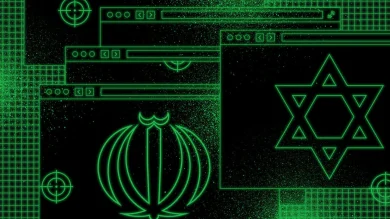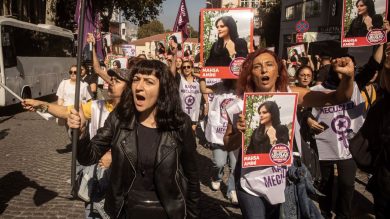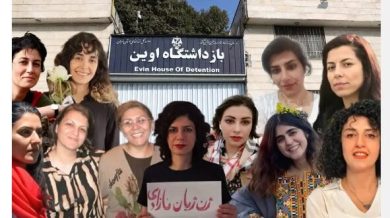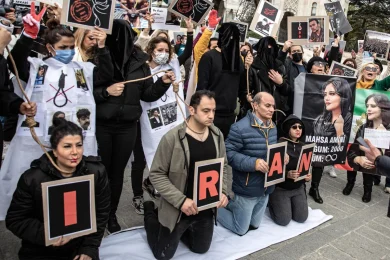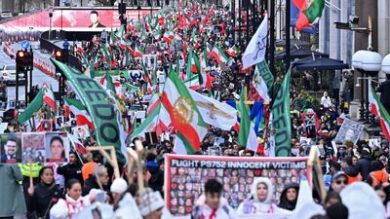The Islamic Revolutionary Guard Corps (IRGC) is designated as a terrorist organization by multiple countries due to its involvement in terrorism, destabilizing regional activities, and human rights abuses. Established in 1979 to safeguard the Islamic Republic and its revolutionary ideals, the IRGC has evolved into a powerful political, military, and economic entity. However, its actions extend far beyond Iran’s borders, impacting global security through its support for terrorist organizations, proxy wars, and widespread repression.
This report examines the reasons behind the IRGC’s designation as a terrorist organization, the implications of such designations, and the evidence supporting these decisions.
1. The IRGC’s Designation as a Terrorist Organization
A. Countries Designating the IRGC as a Terrorist Organization
1. United States:
• In April 2019, the U.S. designated the IRGC as a Foreign Terrorist Organization (FTO) under the Immigration and Nationality Act.
• This was the first time a state military entity was officially designated as a terrorist group.
2. Canada:
• Canada listed the IRGC Quds Force as a terrorist entity in 2012 due to its involvement in global terrorism.
• In 2022, Canada announced expanded sanctions targeting broader IRGC activities.
3. Saudi Arabia and Bahrain:
• Both countries classify the IRGC as a terrorist organization, citing its role in supporting proxies that destabilize the region.
4. Other Western Countries:
• Efforts are ongoing in nations like the United Kingdom and European Union to designate the IRGC as a terrorist organization, driven by its regional activities and human rights abuses.
B. Basis for the Designation
• The designation is rooted in the IRGC’s direct and indirect support for terrorist organizations, its role in orchestrating proxy wars, and its involvement in attacks targeting civilians and military personnel.
2. The IRGC’s Role in Terrorism
A. Support for Proxy Groups
• The IRGC’s Quds Force, its elite extraterritorial unit, is responsible for managing and funding Iran’s network of proxies.
1. Hezbollah (Lebanon):
• The IRGC has provided Hezbollah with weapons, training, and financial support since its creation in the 1980s.
• Hezbollah engages in terrorism globally, including attacks on civilians and military personnel.
2. Hamas and Palestinian Islamic Jihad:
• The IRGC supports these groups in their operations against Israel, supplying funds, rockets, and military expertise.
3. Houthis (Yemen):
• The IRGC backs the Houthi rebels, providing advanced weaponry such as drones and missiles used against Saudi Arabia and the UAE.
B. Attacks and Plots Linked to the IRGC
• The IRGC has been directly implicated in numerous terrorist attacks, including:
• 1994 AMIA Bombing in Argentina: Hezbollah, supported by the IRGC, carried out the bombing of a Jewish community center, killing 85 people.
• 2011 Plot to Assassinate the Saudi Ambassador to the U.S.: The IRGC Quds Force was linked to the plot to assassinate Adel al-Jubeir in Washington, D.C.
• Attacks on Gulf Oil Infrastructure: IRGC-aligned groups have targeted oil tankers and facilities, threatening global energy security.
3. Regional Destabilization and Proxy Wars
A. Fueling Sectarian Conflicts
• The IRGC exacerbates sectarian tensions by supporting Shia militias in Sunni-majority countries.
1. Iraq:
• The IRGC funds and trains militias like Kata’ib Hezbollah and Asa’ib Ahl al-Haq, which destabilize Iraq and undermine its sovereignty.
2. Syria:
• The IRGC has provided extensive support to Bashar al-Assad’s regime, including deploying militias and weapons. This has prolonged the Syrian Civil War, resulting in mass casualties and displacement.
3. Yemen:
• IRGC-backed Houthis have launched attacks on Saudi Arabia and the UAE, escalating the Yemeni Civil War and worsening its humanitarian crisis.
B. Threats to Regional Security
• Through its proxies and military interventions, the IRGC undermines peace efforts, disrupts governance, and fuels armed conflicts across the Middle East.
4. Human Rights Violations
A. Domestic Repression
• The IRGC is instrumental in suppressing protests and dissent within Iran, employing violence, surveillance, and mass arrests.
1. Crackdowns on Protests:
• The IRGC and its Basij forces have violently suppressed protests, including the 2019 fuel price protests, where over 1,500 people were killed.
2. Torture and Imprisonment:
• Activists, journalists, and minority groups face arbitrary detention and torture in IRGC-controlled facilities.
B. Targeting Minorities
• The IRGC systematically represses ethnic and religious minorities, including Kurds, Baloch, and Baháʼís, subjecting them to discrimination and violence.
C. Extrajudicial Killings
• The IRGC has been implicated in assassinations of opposition figures and activists abroad, targeting dissidents in Europe, the Middle East, and North America.
5. Evidence Supporting the Designation
A. Intelligence Reports
• Intelligence agencies worldwide have documented IRGC activities linking it to terrorism, proxy wars, and illicit financial networks.
B. Financial Networks
• The IRGC operates a vast economic empire, including front companies and smuggling operations, to fund its activities.
• U.S. and international sanctions have targeted these networks, exposing their connection to terrorism.
C. Witness Accounts
• Testimonies from victims and activists provide evidence of the IRGC’s role in human rights abuses and extraterritorial aggression.
6. Challenges in Countering the IRGC
A. Sanctions Evasion
• The IRGC uses complex networks of front companies and cryptocurrency to bypass sanctions and continue funding its operations.
B. Lack of Global Consensus
• Countries like China and Russia maintain economic and military ties with Iran, undermining efforts to isolate the IRGC.
C. Regional Complexity
• The IRGC’s deep integration with proxies and state institutions makes its influence difficult to dismantle without significant geopolitical consequences.
7. Implications of the Designation
A. Financial and Operational Disruption
• Designating the IRGC as a terrorist organization restricts its access to global financial systems, limiting its ability to fund operations.
• It deters international businesses and governments from engaging with IRGC-linked entities.
B. Political Pressure
• The designation isolates Iran diplomatically, signaling global condemnation of its actions and pressuring the regime to alter its behavior.
C. Risks of Escalation
• The designation increases tensions between Iran and the designating countries, with the IRGC often retaliating through proxy attacks or cyber operations.
8. Recommendations for Future Action
A. Strengthening Sanctions Enforcement
• Enhance international coordination to close loopholes and disrupt IRGC financial networks more effectively.
B. Supporting Regional Allies
• Provide military and intelligence support to countries targeted by IRGC proxies, such as Saudi Arabia, Israel, and Iraq.
C. Amplifying Human Rights Advocacy
• Document and expose the IRGC’s human rights abuses, ensuring accountability through international courts and organizations.
D. Combating Disinformation
• Counter the IRGC’s propaganda by supporting independent media and amplifying credible narratives that expose its actions.
Conclusion
The IRGC’s designation as a terrorist organization by multiple countries underscores its role in fostering terrorism, destabilizing the Middle East, and violating human rights. While global efforts have disrupted its operations, sustained and coordinated action is necessary to counter its influence. By targeting its financial networks, exposing its activities, and supporting regional stability, the international community can limit the IRGC’s ability to perpetuate violence and repression, promoting greater security and accountability worldwide.
Join Our Newsletter!
Stay informed with the latest updates, news, and ways to take action in the fight for justice and global security. Sign up now to get updates delivered straight to your inbox!

